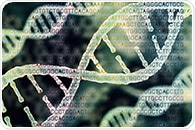| |  Researchers studying mice at Technion-Israel Institute of Technology have found that the microbiome is influenced by genetics much more than it is by the maternal birth environment.Vaginal birth, which involves the transfer of microbiota from mother to newborn, did not have any long-lasting impact on the microbiome of the offspring. Researchers studying mice at Technion-Israel Institute of Technology have found that the microbiome is influenced by genetics much more than it is by the maternal birth environment.Vaginal birth, which involves the transfer of microbiota from mother to newborn, did not have any long-lasting impact on the microbiome of the offspring. | |
|
| |  In a pathbreaking experiment, a 34-year-old mother of four from Mississippi is in the limelight for volunteering to be the subject of CRISPR-mediated gene editing in the hope of achieving a cure for the painful sickle cell anemia with which she has suffered all her life. In a pathbreaking experiment, a 34-year-old mother of four from Mississippi is in the limelight for volunteering to be the subject of CRISPR-mediated gene editing in the hope of achieving a cure for the painful sickle cell anemia with which she has suffered all her life. | |
|
| |  Researchers have found that editing of the genes of the bacteria present in the guts of mice could help reduce the inflammation and associated risk of colorectal cancers. The research from the UT Southwestern scientists has been published this week in the latest issue of the Journal of Experimental Medicine. Researchers have found that editing of the genes of the bacteria present in the guts of mice could help reduce the inflammation and associated risk of colorectal cancers. The research from the UT Southwestern scientists has been published this week in the latest issue of the Journal of Experimental Medicine. | |
|
| |  Researchers and patients from Austin Health and the University of Melbourne have been involved in the largest ever study looking at the genetic sequences of people with epilepsy. The international research, published this week in the American Journal of Human Genetics, involved almost 18,000 people worldwide and identified rare genetic variations that are associated with a higher risk of epilepsy. Researchers and patients from Austin Health and the University of Melbourne have been involved in the largest ever study looking at the genetic sequences of people with epilepsy. The international research, published this week in the American Journal of Human Genetics, involved almost 18,000 people worldwide and identified rare genetic variations that are associated with a higher risk of epilepsy. | |
|
| |  For the first time, scientists have mapped out the genes associated with epilepsy. The study is one of the largest of its kind to look into the genetic make-up of people with epilepsy. The research, which was conducted by scientists from Austin Health and the University of Melbourne was published in the latest issue of the journal American Journal of Human Genetics. For the first time, scientists have mapped out the genes associated with epilepsy. The study is one of the largest of its kind to look into the genetic make-up of people with epilepsy. The research, which was conducted by scientists from Austin Health and the University of Melbourne was published in the latest issue of the journal American Journal of Human Genetics. | |
|
| |  The approach adopted by the team of the University of Trento, led by Anna Cereseto, opens new perspectives in the treatment of cystic fibrosis, a genetic disease for which no cure is currently available. The approach adopted by the team of the University of Trento, led by Anna Cereseto, opens new perspectives in the treatment of cystic fibrosis, a genetic disease for which no cure is currently available. | |
|
| |  Using cutting-edge genomics methods a gene signature predicting type 1 diabetes was discovered. This signature is detectable already before the appearance of type 1 diabetes associated autoantibodies. Using cutting-edge genomics methods a gene signature predicting type 1 diabetes was discovered. This signature is detectable already before the appearance of type 1 diabetes associated autoantibodies. | |
|
| |  Differences in how our brains respond when we're anticipating a financial reward are due, in part, to genetic differences, according to research with identical and fraternal twins published in Psychological Science, a journal of the Association for Psychological Science. Differences in how our brains respond when we're anticipating a financial reward are due, in part, to genetic differences, according to research with identical and fraternal twins published in Psychological Science, a journal of the Association for Psychological Science. | |

































.png)












No hay comentarios:
Publicar un comentario